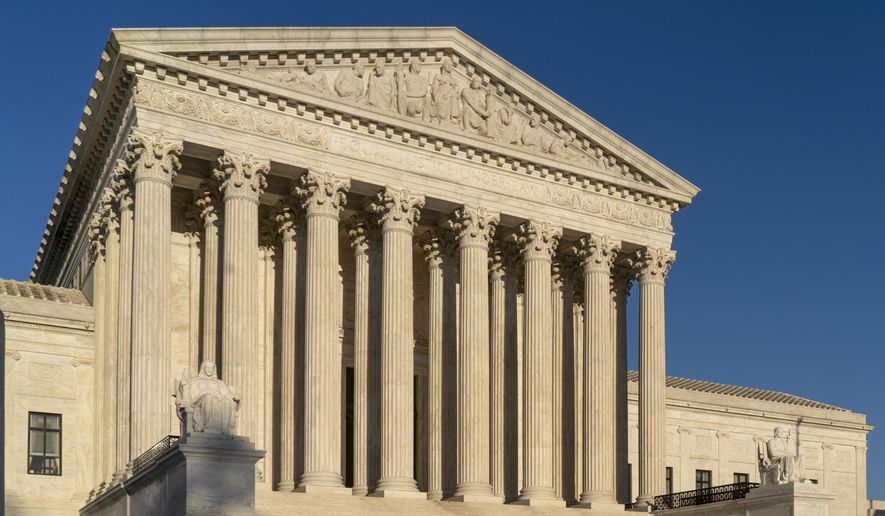The Supreme Court upended decades of precedent Wednesday and ruled that a public-sector labor union can’t force nonmembers to pay dues, a decision that could drain a major source of money from a key ally of the Democratic Party.
The justices, in the 5-4 ruling, said public-sector unions take political positions and that forcing people to pay dues means they end up funding speech and political activity that they might oppose.
“Fundamental free speech rights are at stake,” wrote Justice Samuel A. Alito Jr., who authored the majority opinion.
Labor unions had been bracing for the ruling and warned that public-sector unions would lose influence, giving workers less of a voice in major debates over government services.
The case came from Illinois, where Mark Janus, a child support specialist for the state, sued the American Federation of State, County, and Municipal Employees, Council 31. He said he was not a union member but was still forced to pay about $550 each year to AFSCME, which then advocated for higher government spending or other positions that Mr. Janus opposed.
A lower court, citing a 1977 Supreme Court ruling, sided with the union. In that ruling, Abood v. Detroit Board of Education, the court worried about “free riders” — people who refused to join the union but still benefited from its collective bargaining.
The court on Wednesday overturned Abood. Justice Alito said Mr. Janus was less of a free rider than “a person shanghaied for an unwanted voyage.”
“Whichever description fits the majority of public employees who would not subsidize a union if given the option, avoiding free riders is not a compelling interest,” he wrote.
The court recognized that the decision may cause unions “to experience unpleasant transition costs” but said free speech rights couldn’t be held hostage to those concerns.
“It is hard to estimate how many billions of dollars have been taken from nonmembers and transferred to public-sector unions in violation of the First Amendment. Those unconstitutional exactions cannot be allowed to continue indefinitely,” Justice Alito said.
Justice Elena Kagan, joined by the court’s other Democrat-appointed justices, dissented. She wrote that the decision will transform the relationship between public employees and their employers in unexpected ways and that unions will suffer a financial blow.
She said more than 20 states have laws similar to Illinois based on Abood.
“Those laws underpin thousands of ongoing contracts involving millions of employees. Reliance interests do not come any stronger than those surrounding Abood,” Justice Kagan said.
She called the ruling “judicial disruption.”
President Trump took a victory lap, saying the ruling will hurt Democrats. The party has largely received campaign support from union bosses.
“Supreme Court rules in favor of non-union workers who are now, as an example, able to support a candidate of his or her choice without having those who control the Union deciding for them. Big loss for the coffers of the Democrats!” the president tweeted.
His administration backed Mr. Janus in court, reversing the Obama administration, which sided with the labor unions.
Mr. Janus said the ruling restored the rights of millions of government workers across the country.
“So many of us have been forced to pay for political speech and policy positions with which we disagree, just so we can keep our jobs. This is a victory for all of us. The right to say ’no’ to a union is just as important as the right to say ’yes,’” he said.
Lee Saunders, president of AFSCME, said the court’s ruling was a political attack against unions, which he said propels workers into the middle class.
“They deserve the same freedoms as the CEOs and billionaires who continue to rig the rules against everyone else. The American labor movement lives on, and we’re going to be there every day, fighting hard for all working people, our freedoms and for our country,” Mr. Saunders said.
Tom Perez, chair of the Democratic National Committee and former secretary of labor, said Republican interests were to blame for chipping away at decades of Supreme Court precedent favoring unions.
“Attacking unions is one of the most powerful tactics in the Republican playbook to enrich their wealthy friends at the expense of working people. In fact, Republicans are so determined to undermine workers that they held a Supreme Court seat hostage for nearly a year in order to nominate an aggressively anti-union justice,” said Mr. Perez, putting the blame for the ruling on Mr. Trump’s Supreme Court pick, Justice Neil M. Gorsuch.
• Alex Swoyer can be reached at aswoyer@washingtontimes.com.




Please read our comment policy before commenting.